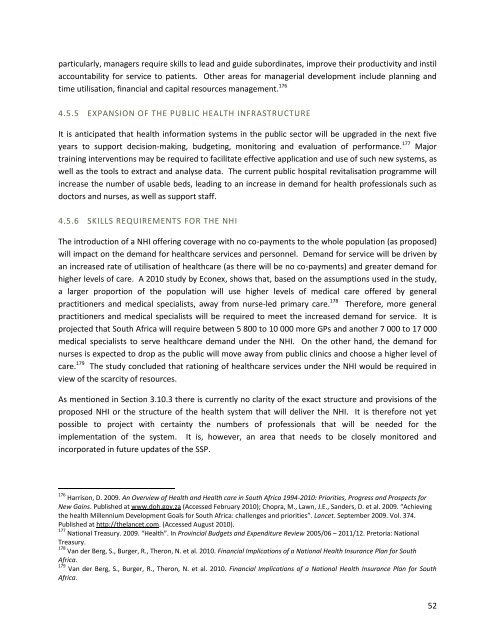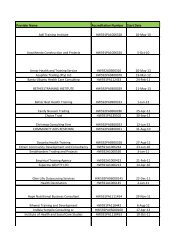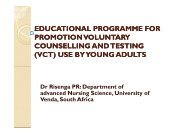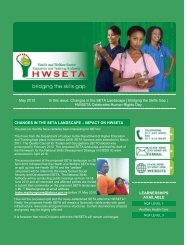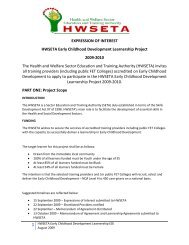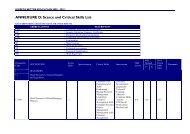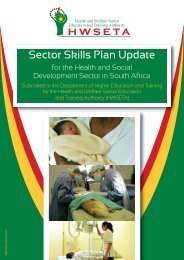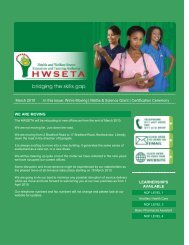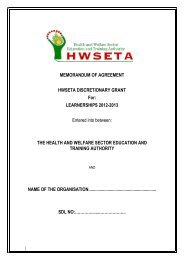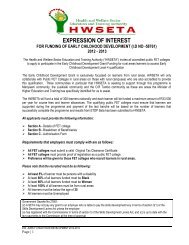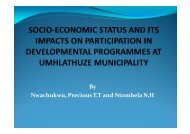sector skills plan for the health sector in south africa
sector skills plan for the health sector in south africa
sector skills plan for the health sector in south africa
You also want an ePaper? Increase the reach of your titles
YUMPU automatically turns print PDFs into web optimized ePapers that Google loves.
particularly, managers require <strong>skills</strong> to lead and guide subord<strong>in</strong>ates, improve <strong>the</strong>ir productivity and <strong>in</strong>stil<br />
accountability <strong>for</strong> service to patients. O<strong>the</strong>r areas <strong>for</strong> managerial development <strong>in</strong>clude <strong>plan</strong>n<strong>in</strong>g and<br />
time utilisation, f<strong>in</strong>ancial and capital resources management. 176<br />
4.5.5 EXPANSION OF THE PUBLIC HEALTH INFRASTRUCTURE<br />
It is anticipated that <strong>health</strong> <strong>in</strong><strong>for</strong>mation systems <strong>in</strong> <strong>the</strong> public <strong>sector</strong> will be upgraded <strong>in</strong> <strong>the</strong> next five<br />
years to support decision-mak<strong>in</strong>g, budget<strong>in</strong>g, monitor<strong>in</strong>g and evaluation of per<strong>for</strong>mance. 177 Major<br />
tra<strong>in</strong><strong>in</strong>g <strong>in</strong>terventions may be required to facilitate effective application and use of such new systems, as<br />
well as <strong>the</strong> tools to extract and analyse data. The current public hospital revitalisation programme will<br />
<strong>in</strong>crease <strong>the</strong> number of usable beds, lead<strong>in</strong>g to an <strong>in</strong>crease <strong>in</strong> demand <strong>for</strong> <strong>health</strong> professionals such as<br />
doctors and nurses, as well as support staff.<br />
4.5.6 SKILLS REQUIREMENTS FOR THE NHI<br />
The <strong>in</strong>troduction of a NHI offer<strong>in</strong>g coverage with no co-payments to <strong>the</strong> whole population (as proposed)<br />
will impact on <strong>the</strong> demand <strong>for</strong> <strong>health</strong>care services and personnel. Demand <strong>for</strong> service will be driven by<br />
an <strong>in</strong>creased rate of utilisation of <strong>health</strong>care (as <strong>the</strong>re will be no co-payments) and greater demand <strong>for</strong><br />
higher levels of care. A 2010 study by Econex, shows that, based on <strong>the</strong> assumptions used <strong>in</strong> <strong>the</strong> study,<br />
a larger proportion of <strong>the</strong> population will use higher levels of medical care offered by general<br />
practitioners and medical specialists, away from nurse-led primary care. 178 There<strong>for</strong>e, more general<br />
practitioners and medical specialists will be required to meet <strong>the</strong> <strong>in</strong>creased demand <strong>for</strong> service. It is<br />
projected that South Africa will require between 5 800 to 10 000 more GPs and ano<strong>the</strong>r 7 000 to 17 000<br />
medical specialists to serve <strong>health</strong>care demand under <strong>the</strong> NHI. On <strong>the</strong> o<strong>the</strong>r hand, <strong>the</strong> demand <strong>for</strong><br />
nurses is expected to drop as <strong>the</strong> public will move away from public cl<strong>in</strong>ics and choose a higher level of<br />
care. 179 The study concluded that ration<strong>in</strong>g of <strong>health</strong>care services under <strong>the</strong> NHI would be required <strong>in</strong><br />
view of <strong>the</strong> scarcity of resources.<br />
As mentioned <strong>in</strong> Section 3.10.3 <strong>the</strong>re is currently no clarity of <strong>the</strong> exact structure and provisions of <strong>the</strong><br />
proposed NHI or <strong>the</strong> structure of <strong>the</strong> <strong>health</strong> system that will deliver <strong>the</strong> NHI. It is <strong>the</strong>re<strong>for</strong>e not yet<br />
possible to project with certa<strong>in</strong>ty <strong>the</strong> numbers of professionals that will be needed <strong>for</strong> <strong>the</strong><br />
implementation of <strong>the</strong> system. It is, however, an area that needs to be closely monitored and<br />
<strong>in</strong>corporated <strong>in</strong> future updates of <strong>the</strong> SSP.<br />
176 Harrison, D. 2009. An Overview of Health and Health care <strong>in</strong> South Africa 1994-2010: Priorities, Progress and Prospects <strong>for</strong><br />
New Ga<strong>in</strong>s. Published at www.doh.gov.za (Accessed February 2010); Chopra, M., Lawn, J.E., Sanders, D. et al. 2009. “Achiev<strong>in</strong>g<br />
<strong>the</strong> <strong>health</strong> Millennium Development Goals <strong>for</strong> South Africa: challenges and priorities”. Lancet. September 2009. Vol. 374.<br />
Published at http://<strong>the</strong>lancet.com. (Accessed August 2010).<br />
177 National Treasury. 2009. “Health”. In Prov<strong>in</strong>cial Budgets and Expenditure Review 2005/06 – 2011/12. Pretoria: National<br />
Treasury.<br />
178 Van der Berg, S., Burger, R., Theron, N. et al. 2010. F<strong>in</strong>ancial Implications of a National Health Insurance Plan <strong>for</strong> South<br />
Africa.<br />
179 Van der Berg, S., Burger, R., Theron, N. et al. 2010. F<strong>in</strong>ancial Implications of a National Health Insurance Plan <strong>for</strong> South<br />
Africa.<br />
52


